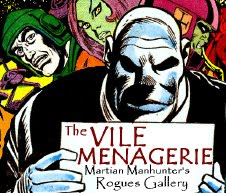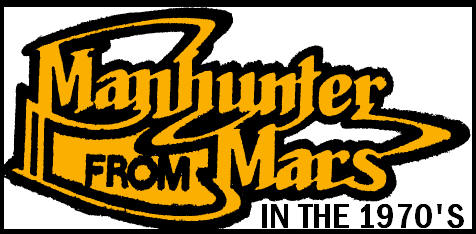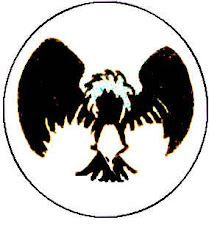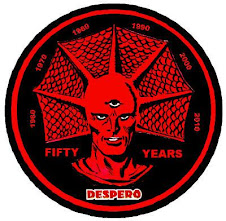
Stacy Dooks is a self-described "thirtysomething wage slave living in Calgary, Alberta and an aspiring writer." She's been blogging since 2008 as "an experiment in creating a public forum for my discussions about comics, pop culture, and writing and what they mean to me." One such avenue is her "Hero Tune-Up" feature, where she tries to address perceived inadequacies in characters that could stand correcting. Shortly after his death at the beginning of
Final Crisis, Dooks turned her eye toward
a posthumous evaluation of the Martian Manhunter. In light of J'Onn J'Onzz's recent resurrection, I'd like to take a moment to compare her observations to the course taken since the end of
Blackest Night.
Dooks states, "He's a Superman/Batman hybrid via Edgar Rice Burroughs Martian Epics, who's easily got the coolest abilities on the block. So why aren't copies of MM comics flying off the shelves?" Her reply to her rhetorical question, "I think it breaks down to the three As: Appearance, Accessibility, and the Alien." Dooks felt that the '50s costume was well past its prime, and that the
One Year Later design was cool, but too dark. "He's one of the last creations of the Silver Age of comics, and while he shouldn't be wearing some weird bathing-suit/suspenders combo with Captain America booties, he should be rocking something a bit more traditionally superheroic."
Now, I have to correct one statement there. Assigning a generous breadth to the Golden Age might consider the Manhunter from Mars one of its last creations, but by most accounts, J'onn J'onzz was among the first Silver Age heroes. Personally, I like to think of him as simply a McCarthy era creation. The golden age of super-heroes ended by 1948, the silver truly began with the reworking of the Flash, and John Jones was more a part of the pre-code middle period dominated by crime comics. It took a few years for the Alien Atlas to emerge as a costumed super-hero, and in many ways the long underwear treatment (or in this case, the disturbing lack thereof) chronically compromised the character's basic concept.
The older I get, the more I'd prefer John Jones to simply wear a nice business suit. The Martian's human guise could re-don the fedora, and when it was time to go xenomorph, the only difference would be the traditional green beetle-browed head displacing the hat. How awesome would it be for J'Onn J'Onzz to engage some celestial menace as part of the Justice League, and when it was over, he'd stand upright and straighten his tie? How about a spiffy vest for his "time to take off the jacket" moments? No one would ever accuse him of being a Superman rip off again, as he'd more closely resemble the Question, but with Laser Vision. Practical is the new black, and a return to more street saavy threads did wonders for Zatanna and Black Canary. Of course, both of those ladies bypassed a strictly tradition turn and updated the more antiquated aspects of their wardrobe. Phil Morris' wardrobe as the last Martian on
Smallville wouldn't hurt my feelings. It isn't an iconic costume J'Onn J'Onzz needs, but a smooth style to match his attitude.
Unfortunately, the current Martian Manhunter costumes on display (including his White Lantern uniform) emphasize super-heroics and flamboyant pulp sci-fi, two of the weakest and least distinctive areas the character can play in. I love J'Onn's green skin, but he's a civilized detective dressed like a barbarian, so he continues to invite unfavorable comparisons to everyone from Tars Tarkas to the Hulk.
Dooks continued by address the issue of accessibility. "Having a superintelligent shapeshifting alien as your lead character can be a bit detrimental if you're hoping to gain your reader's emotional involvement and sustain it over a long period of time. Consider Spider-Man. He's easily one of the most popular superheroes around, because we can relate to him."
I have developed a knee jerk reaction to anyone referencing Peter Parker or "relatability" in heroic fiction. I enjoyed Spider-Man as a child, but was frustrated by the character's limitations before entering junior high, specifically because he was "the hero who could be you" at a time when I didn't much want to be me. In my teens, I embraced the anti-heroic badass because that was how I wished to relate to society. As an adult I prefer aspirational heroes and intriguing concepts, because I want to read about things greater than the world as it stands. I've never been able to appreciate the overabundance of Peter Parkers in heroic fiction because I feel there's an inherent immaturity to the adeloscent wish fulfillment of following a character that is essentially a generic white middle class proxy for the reader.
Thankfully, Dooks shifted her example of a refining role model to Doctor Who. "The Doctor is an alien, the last of his kind, and incredibly intelligent and clever. He walks among us, looking like us, but isn't really a human being. Over the years we've had the odd story where he's on his own, but most often he's accompanied by a number of human companions. These serve two functions; to provide the audience a vicarious place to put our expectations and observations serving as someone we can relate to, and to also ground the character of the Doctor a bit further into human concerns. I think J'onn needs that in order to be a more successful character."
Not only do I agree with this, but I feel that the absence was one of the obvious failings of the Ostrander ongoing series. Beginning toward the end of the Conway years on
Justice League of America and emphasized later by DeMatteis, Gypsy became J'Onn's surrogate daughter. This led to J'Onn and Gypsy being paired off as the constants in the
Mission: Impossible style situational team book
Justice League Task Force. However, the real star of that title in its first year was stunt casting, as it cycled through heroes, writers, crossover events, and fill-in artists during Sal Velluto's regular months off. By the time the book was revised as a "young heroes" group, no one was reading it. Still, a highlight of the series's remaining two years was the interplay between the aloof, manipulative guardian Martian Manhunter and the critically sarcastic and danger prone Gypsy
To my dismay, Ostrander dropped that angle to try and milk the prospect of the JLA serving as Martian Manhunter's "supporting cast." In between guest appearances motivated by dollars more than character, Ostrander also tried to shoehorn DEO Agent Cameron Chase into the sidekick role. This betrayed the characterization of her creators, and quite frankly, Chase and J'Onn never really related to or needed one another, except in a sexist "damsel in distress" forced closing to the series. I think Chase could make an excellent "Commissioner Gordon" type law enforcement contact, but her personality is too dry to compliment J'Onn J'Onzz, which needs a sassy contrast like Gypsy (who managed two cameo appearances over Ostrander's 38 issues.)
So far, the closest thing the current post-posthumous Martian Manhunter has had to a supporting player has been Miss Martian. While I approve of the long overdue connection between the characters, this again reinforces the sci-fi super-hero angle, not to mention drawing parallels to the Superman-Supergirl relationship. Finally, Miss Martian is too capable and amiable to offer a strong dynamic with J'Onn J'Onzz over the long haul.
Dooks' finally asserted the necessity of the alien in the atlas, "For by and large the real appeal of the Martian Manhunter lies in the third element." In her assessment, Dooks propagates the popular but faulty assumption that "it is painfully easy to see J'onn as a knockoff of Superman(because, y'know,
he is exactly that.)" My belief is that while an existing character may rip off aspects of another, the character cannot themselves be classified as a rip-off unless they were created as such. The first several years of John Jones stories are quite far removed from anything popularly associated with Superman, so it wasn't until the strip moved toward straightforward super-heroics that the plagiarism began.
Continuing the comparison to Superman, Dooks points out the usual modern parallel that Superman was an infant raised on Earth, while J'Onzz came here as an unwilling immigrant adult. I'd never made the connection before, but I just realized this actually makes them more similar. Kal-El was a baby rocketed to Earth instants before Krypton exploded, while DeMatteis had the last Martian teleported to Earth right before he would have died from the same plague as his people. A less recent realization was that since the Silver Age Superman was constantly time-traveling for doomed attempts to save Krypton, he shared with the Modern Age Martian Manhunter fresh adult memories of his people's tragic fate. It's something of a damned if you do, damned if you don't consideration. The pathos of a dead Mars has defined J'Onn J'Onzz since 1969, but it's borrowed from Superman, whether the Man of Steel was actively wallowing in it or not.
Personally, I wish DC would either cease to be so self-conscious about reality and restore Mars as a living planet, or recall that there should still be a Mars II out there somewhere inhabited by Re's Eda, Bel Juz, and the Marshal. The one area most other iconic heroes cannot compete with the Martian Manhunter in is the deaths of his wife, daughter, and extended family/tribe. If everyone in my life & city dried up and blew away, I don't think it would be any more traumatic than the entire planet dying, seeing as we will never be 100% free of other survivors or sentient lifeforms with which to socialize. Krypton inevitably must die again and again, but Mars need not be trapped in the same cycle, and much could be made of J'Onn J'Onzz as a detective amongst equals in his natural environment. Barring his taking on a sidekick and operating as a Dynamic Duo analogue, J'Onzz need not be the Green Superman forever.
Dooks continues, "That said, he does have the unique vantage point of being Earth's protector, as well as an immigrant who's come to this planet and become quite comfortable with it. He's a booster for humanity as well as a stalwart guardian... Simply put, in my opinion he's often cast as sort of DC's take on the Silver Surfer, and that isn't the best fit. He's more Doctor than Surfer in my opinion." I must again agree. Norrin Radd is a posturing, Shakespearean figure who puts the "pathetic" in "pathos." What most fans love about Martian Manhunter is that he speaks in contractions, is a bit grouchy, is possessed of a sardonic wit, and is an excellent straight man who can still unexpectedly zing the most sacred of cows as a wry equal. Yes, he's sad guy, and that's another endearing aspect, but it's his dimensions and versatility that makes him an under appreciated great. Use the alien-- the foreign-- the downright creepy, but peculiar humor and uncommon insight are other potentially unearthly charms. Perhaps J'Onn doesn't need to be more extraterrestrial to stand out, but just the opportunity to be more, period. Mr. Spock in a speedo can only take him so far...
For more duking with Dooks, check out
Hero Tune-Up: Aquaman.





























